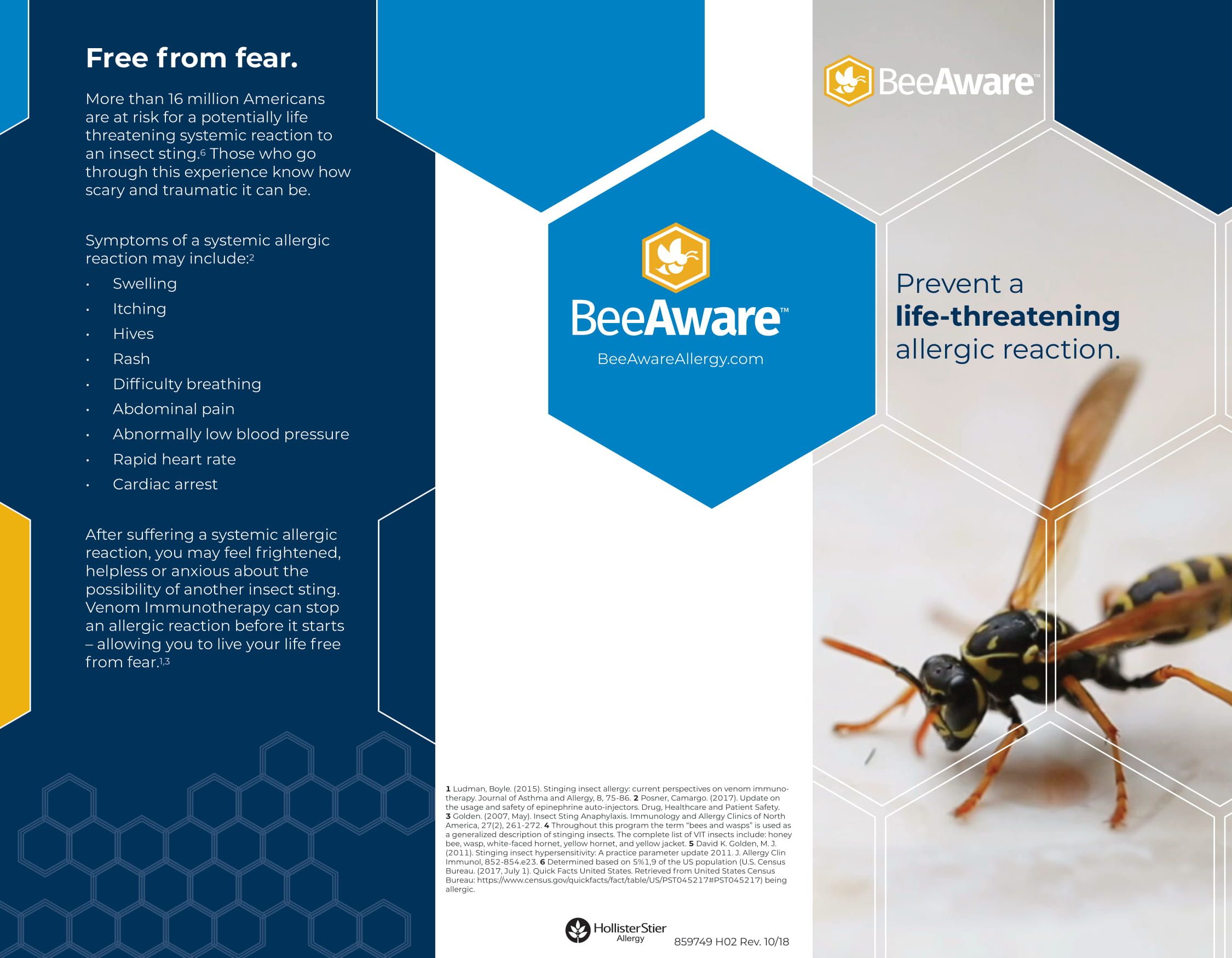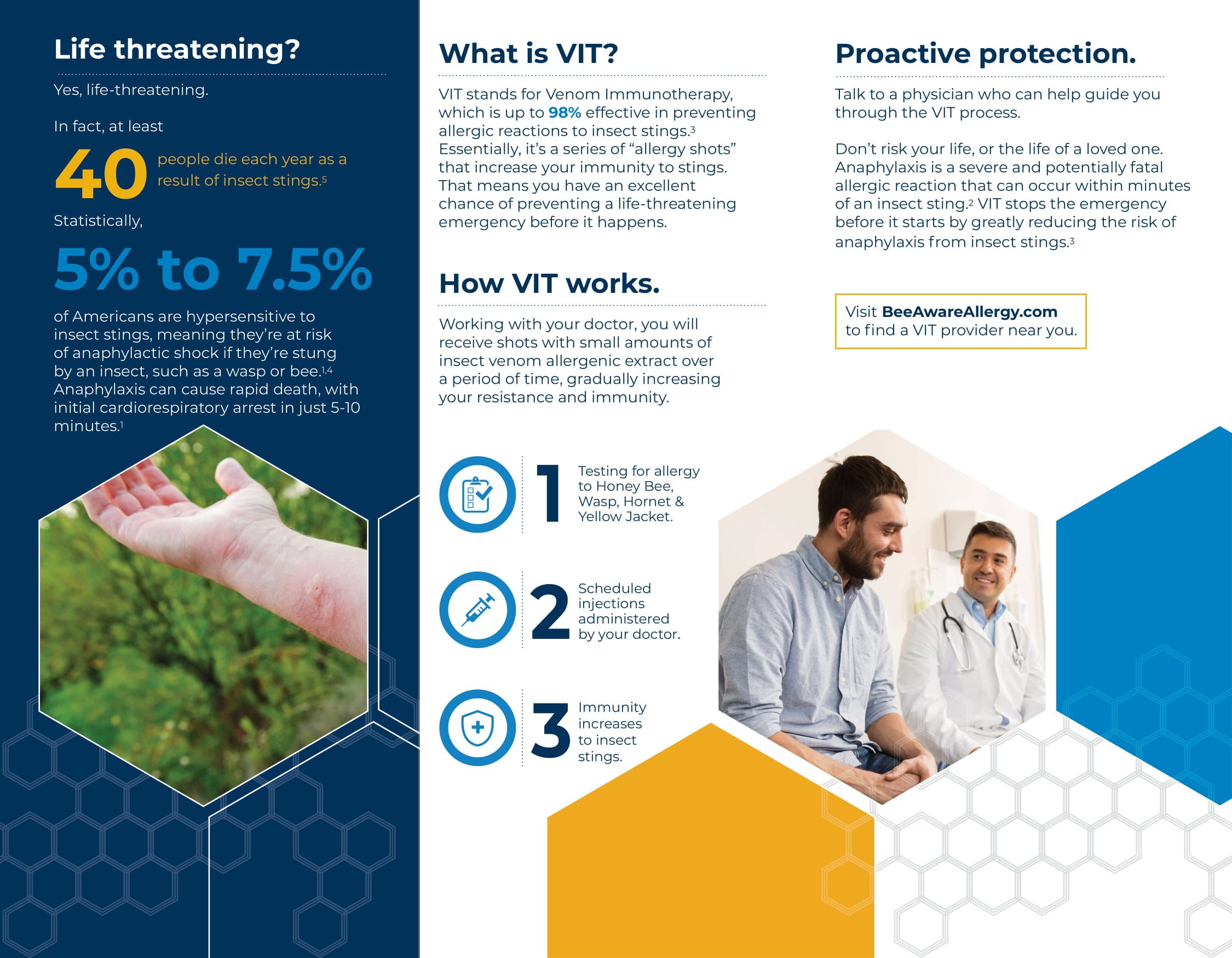Insect Sting Skin Testing
Positive skin tests to Hymenoptera venom extracts confirm immediate hypersensitivity in the context of a positive sting reaction history and help identify specific insects to which a patient is allergic.
Venom protein extracts are used for diagnostic testing. Hymenoptera venom testing is usually performed with each of the five commercial venom extracts (i.e. bees, wasps, yellow jacket, yellow hornet and white faced hornet) available in the United States, because patients are often inaccurate with regard to identification of the “culprit” stinging insect.
Venom testing is usually performed initially with prick tests. If results are negative, intradermal (where a small amount of the allergen is injected under the skin of the arm) skin tests are performed beginning with a venom concentration around 0.001 μg/mL. If the skin tests at this concentration are still negative, the venom concentration is increased by 10-fold increments until a positive skin test occurs, up to a maximum concentration of 1.0 μg/mL.
Skin tests are often positive to several venoms even when there has been a reaction to only a single insect sting. This is because of the known cross-reactivities among the vespid venoms.
Skin tests can be negative, even in patients with convincing histories of sting reactions. Skin test findings may be negative during the first 6 weeks after a sting because of a refractory period. Skin testing should be repeated after 1 or 2 months in these patients.
Some patients with a positive history and a negative skin test do have venom-specific IgE antibodies in the serum that can be detected by serologic testing using a radioallergosorbent test.
The board-certified allergists follow the updated AAAAI allergy practice parameter for stinging insect hypersensitivity. It recommends that for patients who have had a severe systemic reaction to an insect sting and who have negative venom skin test, repeat skin testing or in vitro testing for venom-specific IgE antibodies should be performed before concluding that venom immunotherapy is not necessary.
Prevent a life-threatening allergic reaction to venom
Life threatening?
Yes, life-threatening. In fact, at least 40 people die each year as a result of insect stings. Statistically, 5% to 7.5% of Americans are hypersensitive to insect stings, meaning they’re at risk of anaphylactic shock if they’re stung by an insect, such as a wasp or bee. Anaphylaxis can cause rapid death, with initial cardiorespiratory arrest in just 5-10 minutes.
What is VIT?
VIT stands for Venom Immunotherapy, which is up to 98% effective in preventing allergic reactions to insect stings. Essentially, it’s a series of “allergy shots” that increase your immunity to stings. That means you have an excellent chance of preventing a life-threatening emergency before it happens.
How VIT works.
Working with your doctor, you will receive shots with small amounts of insect venom allergenic extract over a period of time, gradually increasing your resistance and immunity.
- Testing for allergy to Honey Bee, Wasp, Hornet & Yellow Jacket.
- Scheduled injections administered by your doctor
- Immunity increases to insect stings.
Proactive protection.
Talk to a physician who can help guide you through the VIT process.
Don’t risk your life, or the life of a loved one. Anaphylaxis is a severe and potentially fatal allergic reaction that can occur within minutes of an insect sting. VIT stops the emergency before it starts by greatly reducing the risk of anaphylaxis from insect stings.
Free from fear.
More than 16 million Americans are at risk for a potentially life threatening systemic reaction to an insect sting. Those who go through this experience know how scary and traumatic it can be.
Symptoms of a systemic allergic reaction may include:
- Swelling
- Itching
- Hives
- Rash
- Difficulty breathing
- Abdominal pain
- Abnormally low blood pressure
- Rapid heart rate
- Cardiac arrest
After suffering a systemic allergic reaction, you may feel frightened, helpless or anxious about the possibility of another insect sting. Venom Immunotherapy can stop an allergic reaction before it starts – allowing you to live your life free from fear.
Beeaware Brochure


